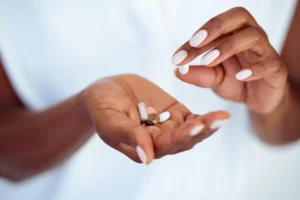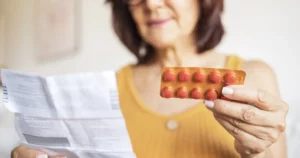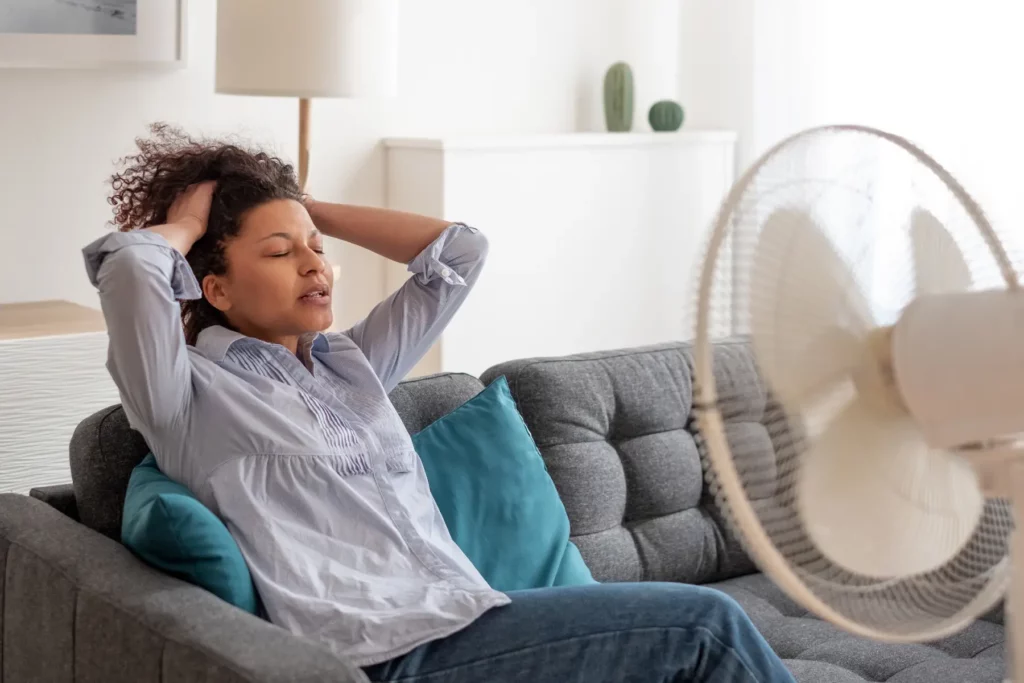In menopause, a phase where your body undergoes big changes, it’s like a hormonal shift. The key players, estrogen, and progesterone decide to take a break, leading to a mix of symptoms. When your monthly periods say goodbye, these hormones drop, bringing along unwelcome guests like hot flashes, night sweats, and even a touch of vaginal dryness. Now, here’s the deal: Menopausal hormone therapy is usually the go-to for managing these symptoms. But hold on, not everyone can rely on estrogen. Take folks dealing with breast cancer, for instance – estrogen is a no-go. So, what’s the plan for relief? Enter non-hormone therapy for menopause – a game-changer that can step in to help you out.
Now, let’s explore some practical ways to deal with those changes and non-hormone options that can help make the menopausal journey a bit smoother.
Best Non-Hormone Therapy Strategies For Menopause
Navigating menopausal symptoms without hormones? Let’s delve into the best non-hormone therapies to make this journey smoother.
Impact of Nutrition on Menopausal Symptoms
 During menopause, what you eat can significantly affect how you feel. One major player? Hot flashes. These unwelcome heat waves can disrupt your day, but fear not – your diet can be a game-changer.
During menopause, what you eat can significantly affect how you feel. One major player? Hot flashes. These unwelcome heat waves can disrupt your day, but fear not – your diet can be a game-changer.
Practical Dietary Changes and Meal Ideas:
- Cooling Foods: Incorporate foods like cucumbers, watermelon, and mint to help tame hot flashes.
- Steady Blood Sugar: Opt for whole grains and lean proteins to maintain stable blood sugar levels, reducing mood swings.
Importance of Specific Nutrients for Menopausal Well-Being: Certain nutrients can be your allies in the battle against menopausal symptoms.
- Calcium and Vitamin D: Essential for bone health, crucial during menopause when the risk of osteoporosis increases.
- Omega-3 Fatty Acids: Found in fish, flaxseeds, and walnuts, they may ease mood swings and support heart health.
Remember, what’s on your plate can play a role in how you feel during menopause. Let’s make those dietary changes and conquer those symptoms!
Mind-Body Practices for Menopause Harmony
 The connection between mental well-being and menopausal symptoms is the first step to finding balance. The way you feel mentally can impact those physical symptoms. Stress, mood swings, and sleep disturbances often go hand-in-hand with menopause.
The connection between mental well-being and menopausal symptoms is the first step to finding balance. The way you feel mentally can impact those physical symptoms. Stress, mood swings, and sleep disturbances often go hand-in-hand with menopause.
Mindfulness and Relaxation Techniques: Enter mindfulness and relaxation – your ally to find relief from menopausal chaos. Mindfulness brings you into the present moment, while relaxation techniques ease tension. Picture this: a mental spa day.
Realistic Ways to Incorporate These Practices into Daily Life:
- Morning Mindfulness: Start your day with a few minutes of mindful breathing. Focus on each breath, and let the worries fade away.
- Evening Unwind: Before bed, try progressive muscle relaxation. Tense and release each muscle group for a peaceful night’s sleep.
- Mini Mindful Moments: Sneak in mindfulness during daily activities. Whether it’s sipping tea or taking a stroll, be present in the moment.
By blending mind and body practices into your routine, you’re not just managing symptoms; you’re embracing menopause with harmony. Make mindfulness and relaxation part of our daily playbook!
Exercise: A Natural Menopause Support System
 Physical activity isn’t just about staying fit – it plays a crucial role in taming those menopausal challenges. From mood swings to sleep disturbances, exercise can be a natural ally.
Physical activity isn’t just about staying fit – it plays a crucial role in taming those menopausal challenges. From mood swings to sleep disturbances, exercise can be a natural ally.
Present Practical and Achievable Exercise Routines: No need for extreme workouts; simple and consistent is the key:
- Brisk Walking: An accessible and effective way to get your heart pumping without high impact.
- Yoga or Pilates: Enhance flexibility, strength, and balance – easing joint pains and promoting overall well-being.
- Strength Training: Boost metabolism and maintain muscle mass to counteract the natural decline in estrogen.
Emphasize the Benefits of a Consistent Exercise Regimen: Consistency is where the magic happens:
- Exercise releases endorphins, the feel-good hormones, help combat mood swings and stress.
- Regular physical activity promotes restful sleep, a common challenge during menopause.
- Counteract potential weight gain associated with hormonal changes.
Let’s make exercise a natural part of your menopausal support system. Simple routines, big benefits – it’s time to embrace the vitality that comes with movement.
Herbal Remedies: Nature’s Menopause Allies
 Nature has a bounty of remedies that might just be what you need:
Nature has a bounty of remedies that might just be what you need:
- Black Cohosh: Known for its potential to reduce hot flashes and improve sleep.
- Dong Quai: Thought to help balance estrogen levels, addressing various menopausal symptoms.
- Red Clover: Rich in isoflavones, believed to alleviate hot flashes and support bone health.
Separate fact from fiction – some herbs have evidence backing their effectiveness:
- Sage: Studies suggest it may reduce the frequency and intensity of hot flashes.
- Chasteberry: Known to help regulate hormonal imbalances and manage mood swings.
How you can make herbs part of your routine?
- Always seek advice from a healthcare provider before trying herbal supplements.
- Enjoy the benefits by incorporating herbal teas into your daily rituals.
- Some herbs can be used in cooking, adding flavor and potential health benefits.
Medications to Find Relief from Menopause Symptoms
 When the going gets tough, medications can be a valuable ally in managing menopausal symptoms. Let’s explore some options that offer relief, especially for those unable to take estrogen.
When the going gets tough, medications can be a valuable ally in managing menopausal symptoms. Let’s explore some options that offer relief, especially for those unable to take estrogen.
Antidepressant Medications for Hot Flashes: For individuals unable to take estrogen, antidepressants often step into the spotlight as a first-line treatment for hot flashes. These medications work on the nervous system, helping to alleviate the intensity and frequency of those sudden bouts of heat.
Common Antidepressants for Hot Flashes:
- Venlafaxine and Desvenlafaxine: Dual-purpose antidepressants, they’ve shown efficacy in reducing hot flashes.
- Fluoxetine (SSRI): Originally used to treat mood disorders, it’s now approved specifically for managing hot flashes.
- Paroxetine (SSRI): Another selective serotonin reuptake inhibitor (SSRI) recognized for its effectiveness in reducing hot flashes.
Non-Antidepressant Medications: Beyond antidepressants, a couple of other medications also make their mark:
- Gabapentin: Originally an anti-seizure medication, it has shown promise in reducing hot flashes.
- Oxybutynin: Typically used to treat overactive bladder, it might also help in managing certain menopausal symptoms.
Understanding your options and consulting with a healthcare professional is key when considering medications. These can be powerful tools in finding relief from the challenges that menopause brings.
Non-Hormone Therapy to Find Relief from Vaginal Dryness
 Entering the realm of menopause in your 40s and 50s is like stepping onto a new path, and it may come with its share of challenges. One common foe? Vaginal dryness. As estrogen levels take a dip during menopause, the walls of your vagina may experience changes, becoming thinner and less elastic.
Entering the realm of menopause in your 40s and 50s is like stepping onto a new path, and it may come with its share of challenges. One common foe? Vaginal dryness. As estrogen levels take a dip during menopause, the walls of your vagina may experience changes, becoming thinner and less elastic.
Normally, your vagina is lubricated with a thin layer of clear fluid. However, as menopause progresses, this lubrication can dwindle, leading to discomfort and irritation.
Non-Hormone Therapy Approaches – Lubricants and Moisturizers: The good news? You don’t need hormones to find relief. Two non-hormonal options—lubricants and moisturizers—have proven effective in alleviating vaginal symptoms. These can restore moisture, ease discomfort, and enhance comfort during intimate moments.
Curious to delve deeper into managing vaginal symptoms during menopause? Head over to our blog on “Vaginal Creams for Menopause: How to Use, Side Effects & More…” for an in-depth guide on additional options to care for and soothe this aspect of your well-being.
Conclusion
As we wrap up this exploration of non-hormone therapy for menopause symptoms, remember that menopause is a unique journey, and there’s no one-size-fits-all solution. From nutritional shifts to mind-body practices, exercise routines to herbal allies, and non-hormonal interventions for specific symptoms, you have a palette of choices.
If you are facing menopause-related issues, menopause treatment at HerMantra can help. Book your free trial online menopause treatment session now.


